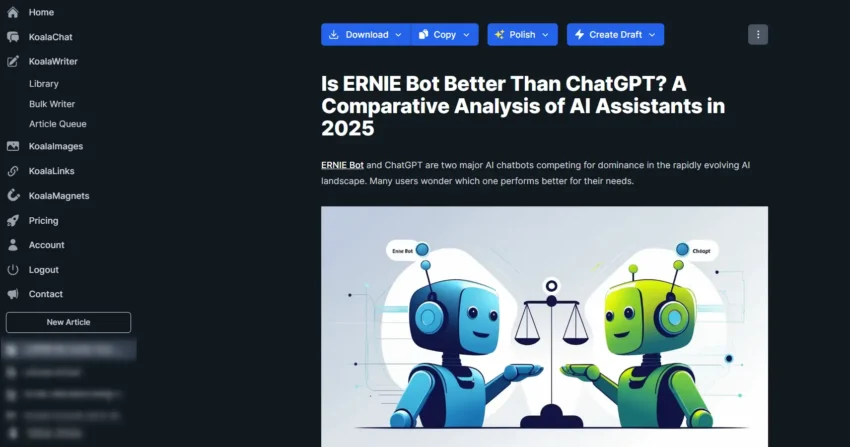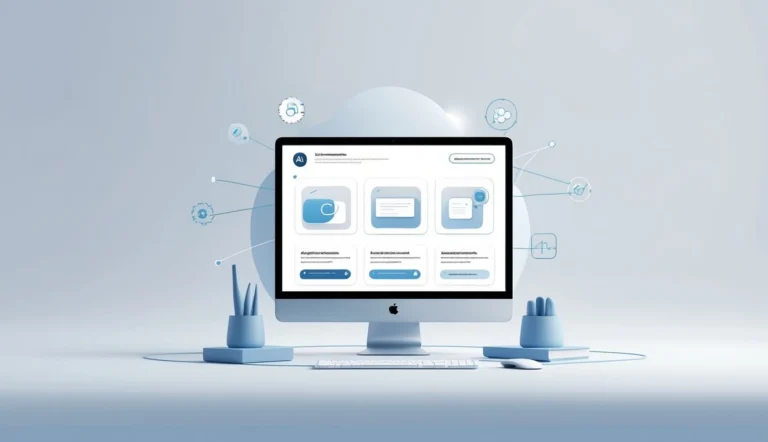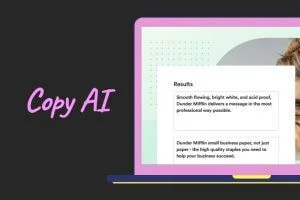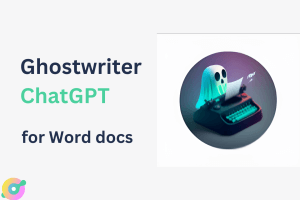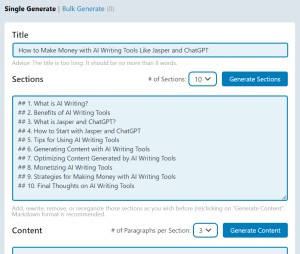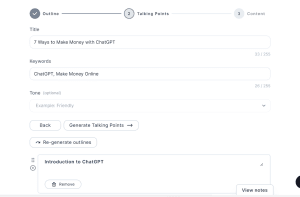Have you ever wondered what AI could do if it acted completely on its own?
Agentic AI is a type of AI that can pursue goals and complete tasks independently. With just natural language instructions, these AI systems can work in complex environments with little to no human supervision.
Imagine an AI that not only follows your commands but also makes smart decisions on its own. This is the core of agentic AI, unlocking new levels of efficiency and productivity.
So, whether it’s transforming businesses or enhancing customer experiences, agentic AI has the potential to revolutionize various fields.
Stay with us as we dive deeper into how agentic AI works, its unique features, and what it means for the future of technology and innovation.
What is Agentic AI
Agentic AI refers to artificial intelligence systems designed to operate autonomously and make decisions with minimal human intervention. One great example is Manus AI, launched in March 2025
These systems possess several key characteristics:
- Autonomy: They can take goal-directed actions independently, based on predefined objectives or learned behaviors
- Reasoning: They have advanced decision-making capabilities, allowing them to evaluate context and make informed choices.
- Adaptability: They can adjust their strategies and actions based on changes in their environment or objectives.
- Perception: They can interpret and understand their surroundings through various sensors and data inputs.
These attributes enable agentic AI to handle complex tasks such as optimizing supply chains, managing inventory, and enhancing user experiences by providing more intuitive and responsive interactions.
They use advanced decision-making capabilities, allowing them to make contextual judgments, initiate actions, and balance trade-offs. For example, Agentic AI can alter its approach based on new information or a changing environment, ensuring continuous improvement.
AI agents thus act independently and make decisions without human oversight. They set goals, learn from interactions, and adjust their actions based on the context and feedback.
Notably, Agentic AI can transform business operations by handling end-to-end tasks. This means it can streamline workflows, improve efficiency, and enhance customer interactions.
By acting independently, these AI systems can provide more personalized and effective services.
How agentic ais differ from reactive AI
Unlike reactive AI, which responds to inputs in a predefined manner, Agentic AI can anticipate needs and proactively take action. Reactive AI is limited to set tasks, whereas Agentic AI can adapt and evolve.
Reactive AI relies on humans to give commands and interpret outputs. In contrast, Agentic AI uses self-learning mechanisms to understand context, make decisions, and even predict future outcomes.
Moreover, Agentic AI’s ability to function independently, without ongoing human intervention, sets it apart from traditional AI.
This independence enables it to handle complex scenarios and make more informed decisions, significantly enhancing productivity and operational efficiency.
By continuously learning from its environment and interactions, Agentic AI represents a more advanced stage in the evolution of AI tech.
Agentic workflows
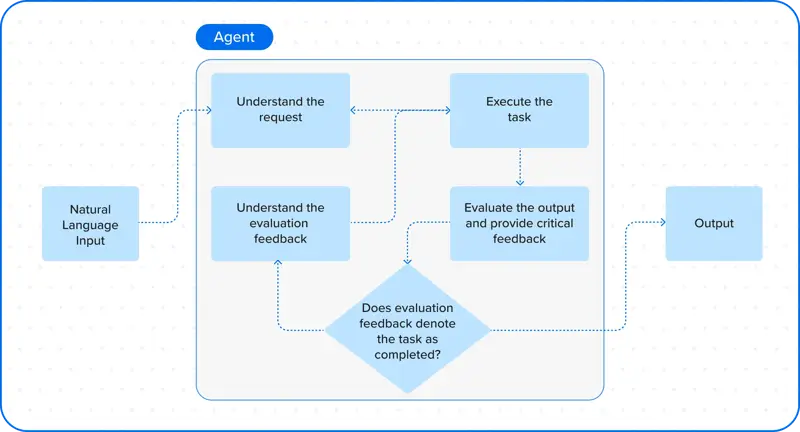
Agentic workflows involve AI systems executing complex tasks through multi-step processes, improving efficiency and productivity significantly.
These workflows integrate planning, tool use, reflection, and multi-agent collaboration to optimize outcomes.
What is an agentic workflow
An agentic workflow is when AI systems actively assist users by executing steps to handle tasks. This differs from simple, one-step AI responses. These workflows are built on four main components:
- Reflection: The AI reviews its work and finds ways to improve.
- Tool use: The AI uses tools for gathering information, making decisions, and performing actions.
- Planning: The AI creates a step-by-step plan to achieve its objectives, ideal for complex tasks.
- Multi-Agent collaboration: Multiple AI agents work together, each handling different tasks to provide a unified solution.
These elements allow the AI to act more intelligently and autonomously, enhancing the overall user experience.
Typical agentic workflow – customer service request
In a customer service scenario, an agentic workflow can streamline how requests are handled. When a customer sends a request, the AI first plans the workflow, breaking it into smaller tasks.
- Receiving the request: The AI captures the customer inquiry and identifies the issue.
- Information gathering: The AI uses various tools to collect necessary information from databases or external sources.
- Decision making: Based on the gathered data, the AI evaluates possible solutions.
- Action: The AI takes action, such as solving the problem or escalating it to a human agent if required.
- Review and improve: Finally, the AI reviews the interaction for potential improvements in future requests.
By following these steps, the AI enhances the efficiency and quality of customer support, making the service more responsive and resourceful.
Benefits of Agentic AI
Increased efficiency and productivity
Agentic AI drastically improves efficiency by automating routine tasks. This allows employees to focus on more complex activities. Businesses can handle higher volumes of work without additional staffing.
Enhanced decision-making
These systems collect and analyze vast amounts of data quickly. This leads to better, faster decisions. By processing real-time information, agentic AI provides insights that drive strategic planning and operational adjustments.
Reduction in human error
AI reduces the likelihood of mistakes in data entry and processing. This accuracy is crucial in industries where errors can have significant consequences, like finance and healthcare.
Cost savings
Implementing agentic AI can result in substantial cost savings. Automating tasks reduces labor costs. Also, fewer errors mean less money spent on correcting mistakes, leading to overall financial benefits for organizations.
Applications of Agentic AI

Autonomous Vehicles
Agentic AI drives the way for self-driving cars and drones. In self-driving cars, AI uses sensors and cameras to navigate roads, avoid obstacles, and make real-time decisions. Drones benefit by executing complex tasks like surveying and package delivery without human input.
Personal Assistants
Advanced AI personal assistants can handle a variety of tasks. From setting reminders to booking appointments, these assistants understand natural language and act on your behalf, making daily tasks easier and more convenient.
Healthcare
In healthcare, Agentic AI plays a big role in robotic surgeries. Robots assisted by AI can perform precise operations with minimal invasiveness. This technology also helps in patient care management by monitoring vital signs and alerting caregivers to potential issues.
Finance
Agentic AI is transforming the finance sector. It powers algorithmic trading, where AI makes rapid trading decisions based on market data. In fraud detection, AI systems can analyze transactions in real-time, identifying suspicious activities and preventing fraud.
Smart Cities
AI is making cities smarter by improving traffic management and energy distribution. Traffic management systems use AI to control streetlights and reduce congestion. In energy distribution, AI optimizes the supply and demand balance, ensuring efficient energy use.
How Businesses Can Prepare for Agentic AI
Assessing readiness
The first step is to evaluate your business’s readiness for Agentic AI. Consider the current use of technology in your operations. Identify which processes can benefit from automation. Make a list of your current capabilities and where gaps exist. This exercise will highlight areas that need improvement.
Investing in infrastructure
Prepare your infrastructure for AI integration. Ensure you have the necessary hardware, such as powerful servers and networking equipment. Invest in software that supports AI functionalities. Protect your data with robust security measures. Well-maintained infrastructure is essential for smooth AI operations.
Developing a strategic roadmap
Create a strategic roadmap for AI integration. Start by setting clear, achievable goals. Outline the steps needed to integrate Agentic AI into your business. This could include staff training, pilot projects, and scaling up efforts. Regularly review and adjust your roadmap to stay on track.
Training and education
Educate your workforce about Agentic AI. Provide training on how to use and interact with AI systems. Encourage a culture of continuous learning. This will help your team adapt to new technologies and maximize their use.
Collaboration and partnerships
Form partnerships with AI experts and technology providers. Collaborating with experienced professionals can provide valuable insights and support. Consider working with academic institutions for research opportunities. These partnerships can accelerate your AI journey.
Monitoring and evaluation
Continuously monitor the performance of your AI systems. Evaluate their impact on your business processes. Identify areas for improvement and make necessary adjustments. Regular feedback and evaluation will ensure your AI systems achieve desired outcomes.
Compliance and ethics
Ensure your AI initiatives comply with regulations. Address ethical considerations in AI use, such as data privacy and unbiased decision-making. Implement policies and practices that promote responsible AI use. This will build trust and ensure sustainable AI integration.
Challenges and ethical considerations
Technical Challenges
Developing agentic AI involves complex technical issues.
These systems must make decisions with limited supervision. This requires advanced algorithms and vast amounts of data. Ensuring that these decisions are reliable and safe is critical but challenging. The risk of errors or unintended behavior can have serious consequences.
Ethical Dilemmas
Agentic AI poses several ethical issues.
One major concern is job displacement. These systems can automate tasks that humans perform, potentially leading to job losses. Privacy is another issue, as AI systems can access and analyze personal data on a large scale.
Regulatory Challenges
The legal framework for agentic AI is still evolving.
Current laws may not cover the unique challenges these systems present. Clear regulations are needed to ensure these AI systems operate within ethical boundaries and do not cause harm.
Mitigation Strategies
To address these challenges, several strategies can be adopted:
- Collaboration: Encourage collaboration between technologists, ethicists, and policymakers.
- Transparency: Promote transparency in AI development and deployment.
- Ethical Guidelines: Establish and follow ethical principles, such as fairness, non-discrimination, and respect for privacy.
- Continuous Monitoring: Regularly review and update practices to keep pace with technological advances.
Agentic AI presents significant challenges, but with careful management, it can be developed and deployed responsibly. Ensuring ethical use involves continuous effort and adaptation.
The future of agentic AI tools
Agentic AI tools are evolving quickly.
With technologies like quantum computing, these tools will get even more powerful. This means faster processing and solving complex problems that typical computers can’t handle effectively.
5G technology plays a big role, too.
Faster internet speeds and reduced latency will enable real-time interactions between AI agents and users. This will improve things like virtual assistants and automated customer service.
Future applications of Agentic AI tools include virtual workforces.
These workforces mix human employees and AI agents. The AI agents can manage workflows, provide services, and even execute transactions, making many business processes more efficient.
Example applications:
- Customer service: AI agents can provide instant responses to customer inquiries, improving satisfaction and efficiency.
- Data analysis: AI agents can quickly analyze large datasets, providing insights and recommendations faster than human analysts.
Societal impacts will be significant as these tools become more common.
They might change how people work and interact with technology. Jobs will evolve, focusing more on tasks that require human creativity and judgement.
- Efficiency: Task automation can reduce the workload for employees.
- Innovation: AI tools can suggest new ways to solve problems and approach tasks.
- Collaboration: Human-AI collaboration will become the norm, enhancing productivity and creativity.
AI tools will also need to follow ethical guidelines.
Ensuring they operate within safe and responsible limits will be crucial as they become more capable and integrated into everyday life.
Case Studies
Agentic AI in Healthcare
In healthcare, Agentic AI can manage patient scheduling.
For example, systems can organize appointments based on patient needs, improving efficiency. They can also handle patient queries using natural language processing.
Autonomous Cloud Management
Autonomous cloud systems can optimize resource allocation without human intervention.
These systems analyze data usage patterns and predict future needs, saving costs and increasing efficiency.
Customer Support Transformation
Agentic AI in customer support can handle routine inquiries.
By managing FAQs and troubleshooting, it allows human agents to focus on complex issues. This technology can improve response times and enhance customer satisfaction.
Key Insights from Industry Leaders
Industry leaders have shared valuable insights about Agentic AI. According to Haptik, these systems can set goals and learn from interactions, transforming business operations.
Success Stories
- Retail Sector: An online retailer implemented Agentic AI to manage supply chains.
- The system optimized stock levels, leading to reduced waste and better inventory control.
- Finance: Banks utilize Agentic AI for fraud detection.
- The systems analyze transaction patterns, identify anomalies, and flag suspicious activities in real-time.
Lessons Learned
- Scalability: It’s important to ensure the AI system can handle increased workloads.
- Human Oversight: Although Agentic AI operates independently, human oversight ensures it aligns with broader goals.
Conclusion
Agentic AI offers significant advancements over traditional AI. It makes independent decisions and learns from interactions. This ability helps businesses streamline operations and enhance customer experiences.
Reflect on how agentic AI represents a major shift in technology. It promises to transform industries, making processes more efficient and interactions more intuitive.
As AI continues to evolve, stay informed about developments in this field. Engaging with current trends and understanding their impacts will help you navigate the changing landscape.


